BMO1102 Research Essay: Motivation, Expectancy Theory, and Performance
VerifiedAdded on 2023/01/19
|6
|1880
|82
Essay
AI Summary
This essay delves into the critical role of motivation in organizational behaviour and its impact on academic performance, referencing Vroom's Expectancy Theory as a central framework. The essay explores how motivation, influenced by factors like rewards, employee skills, and personal goals, affects performance within organizations. It examines the components of Expectancy Theory (expectancy, instrumentality, and valence) and their influence on employee behavior and decision-making. The discussion extends to the relationship between motivation and academic success, highlighting the role of parental motivation and personal goals. The essay concludes by emphasizing the importance of motivation techniques and their implications for improving performance in both organizational and academic contexts. References include Bauman & Bonner (2016), Lăzăroiu (2015), Lloyd & Mertens (2018), Ron & John (2009), and Yu-Wei, Ping-Yu & Zeng-Yuan (2015).
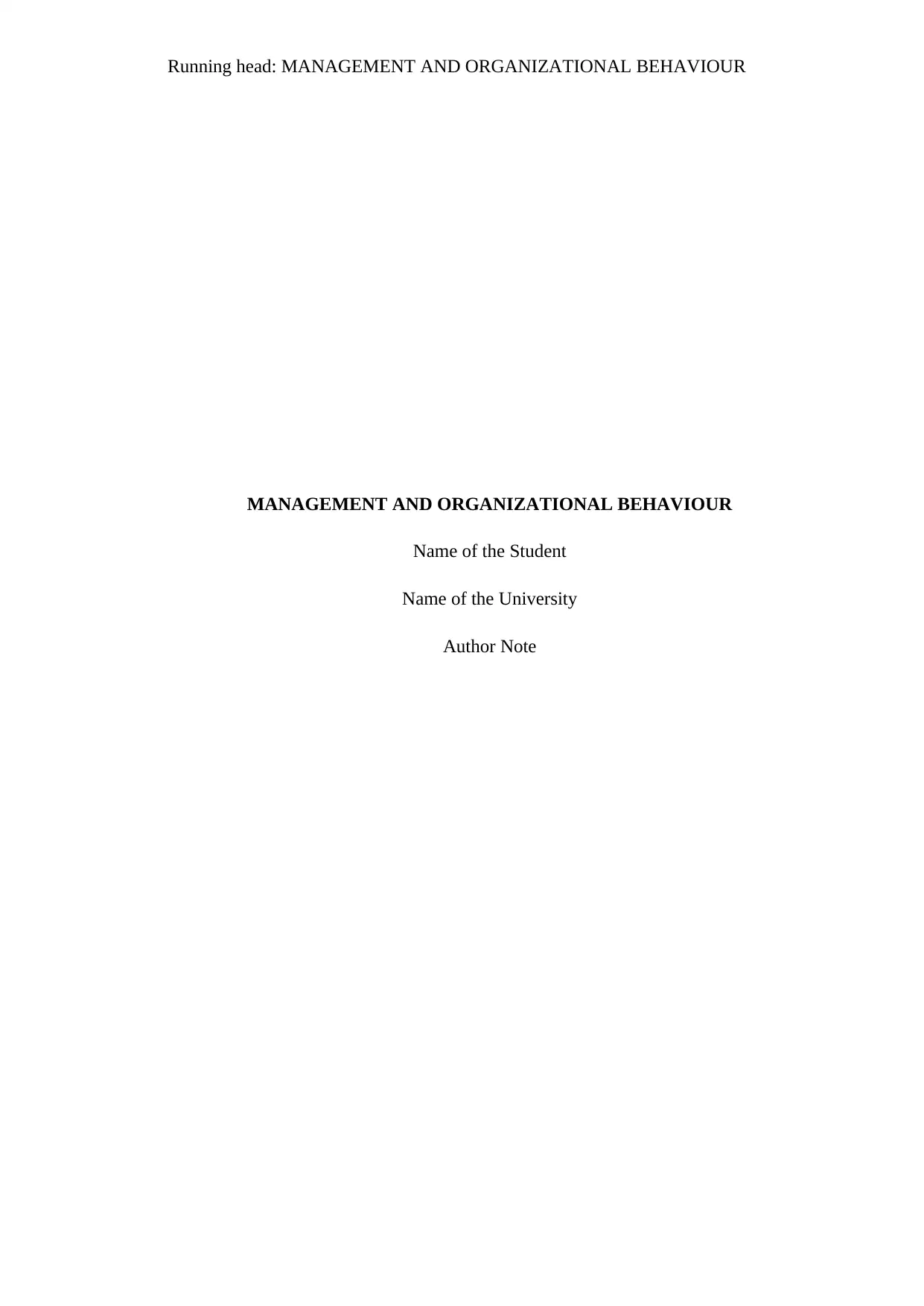
Running head: MANAGEMENT AND ORGANIZATIONAL BEHAVIOUR
MANAGEMENT AND ORGANIZATIONAL BEHAVIOUR
Name of the Student
Name of the University
Author Note
MANAGEMENT AND ORGANIZATIONAL BEHAVIOUR
Name of the Student
Name of the University
Author Note
Paraphrase This Document
Need a fresh take? Get an instant paraphrase of this document with our AI Paraphraser
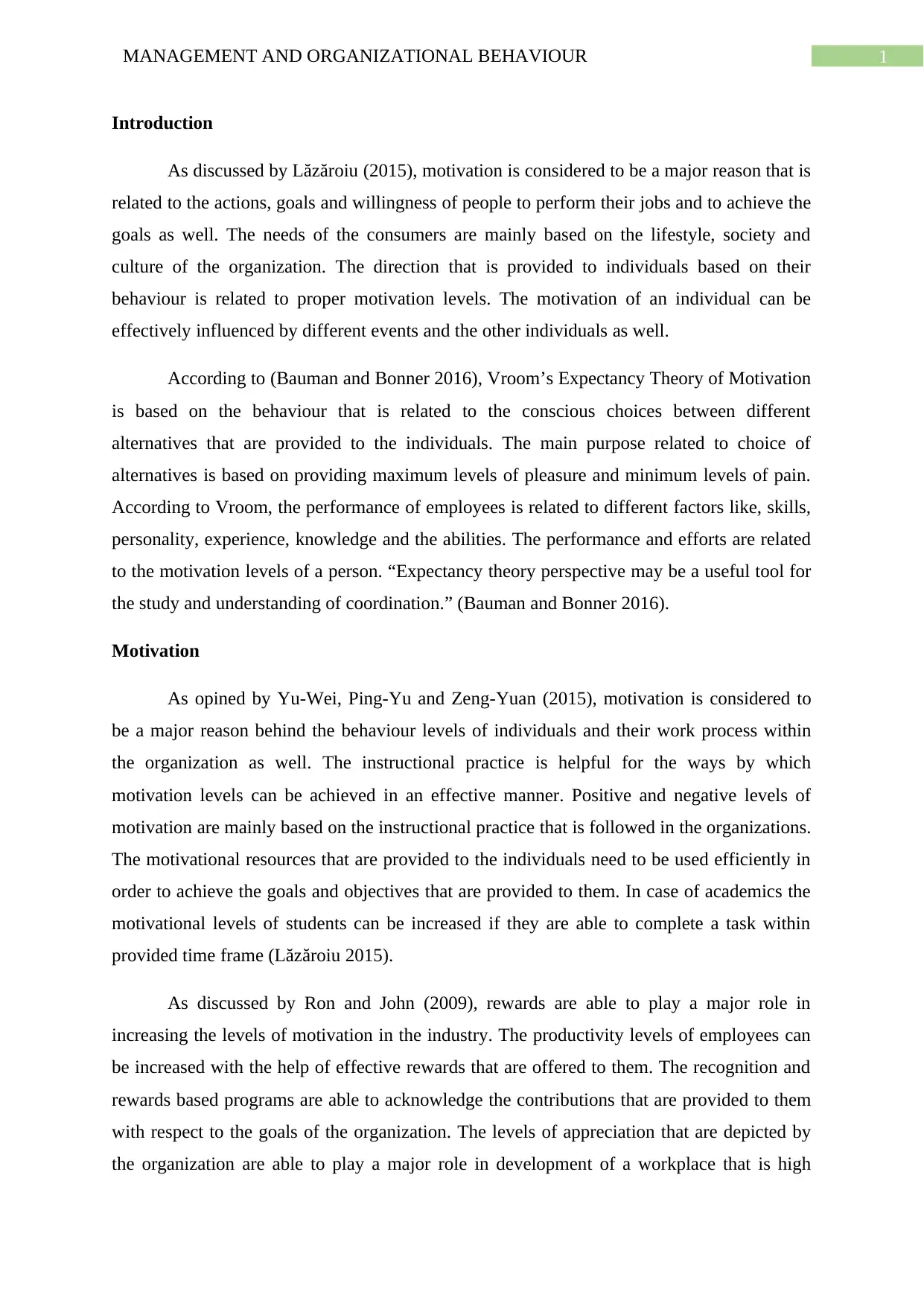
1MANAGEMENT AND ORGANIZATIONAL BEHAVIOUR
Introduction
As discussed by Lăzăroiu (2015), motivation is considered to be a major reason that is
related to the actions, goals and willingness of people to perform their jobs and to achieve the
goals as well. The needs of the consumers are mainly based on the lifestyle, society and
culture of the organization. The direction that is provided to individuals based on their
behaviour is related to proper motivation levels. The motivation of an individual can be
effectively influenced by different events and the other individuals as well.
According to (Bauman and Bonner 2016), Vroom’s Expectancy Theory of Motivation
is based on the behaviour that is related to the conscious choices between different
alternatives that are provided to the individuals. The main purpose related to choice of
alternatives is based on providing maximum levels of pleasure and minimum levels of pain.
According to Vroom, the performance of employees is related to different factors like, skills,
personality, experience, knowledge and the abilities. The performance and efforts are related
to the motivation levels of a person. “Expectancy theory perspective may be a useful tool for
the study and understanding of coordination.” (Bauman and Bonner 2016).
Motivation
As opined by Yu-Wei, Ping-Yu and Zeng-Yuan (2015), motivation is considered to
be a major reason behind the behaviour levels of individuals and their work process within
the organization as well. The instructional practice is helpful for the ways by which
motivation levels can be achieved in an effective manner. Positive and negative levels of
motivation are mainly based on the instructional practice that is followed in the organizations.
The motivational resources that are provided to the individuals need to be used efficiently in
order to achieve the goals and objectives that are provided to them. In case of academics the
motivational levels of students can be increased if they are able to complete a task within
provided time frame (Lăzăroiu 2015).
As discussed by Ron and John (2009), rewards are able to play a major role in
increasing the levels of motivation in the industry. The productivity levels of employees can
be increased with the help of effective rewards that are offered to them. The recognition and
rewards based programs are able to acknowledge the contributions that are provided to them
with respect to the goals of the organization. The levels of appreciation that are depicted by
the organization are able to play a major role in development of a workplace that is high
Introduction
As discussed by Lăzăroiu (2015), motivation is considered to be a major reason that is
related to the actions, goals and willingness of people to perform their jobs and to achieve the
goals as well. The needs of the consumers are mainly based on the lifestyle, society and
culture of the organization. The direction that is provided to individuals based on their
behaviour is related to proper motivation levels. The motivation of an individual can be
effectively influenced by different events and the other individuals as well.
According to (Bauman and Bonner 2016), Vroom’s Expectancy Theory of Motivation
is based on the behaviour that is related to the conscious choices between different
alternatives that are provided to the individuals. The main purpose related to choice of
alternatives is based on providing maximum levels of pleasure and minimum levels of pain.
According to Vroom, the performance of employees is related to different factors like, skills,
personality, experience, knowledge and the abilities. The performance and efforts are related
to the motivation levels of a person. “Expectancy theory perspective may be a useful tool for
the study and understanding of coordination.” (Bauman and Bonner 2016).
Motivation
As opined by Yu-Wei, Ping-Yu and Zeng-Yuan (2015), motivation is considered to
be a major reason behind the behaviour levels of individuals and their work process within
the organization as well. The instructional practice is helpful for the ways by which
motivation levels can be achieved in an effective manner. Positive and negative levels of
motivation are mainly based on the instructional practice that is followed in the organizations.
The motivational resources that are provided to the individuals need to be used efficiently in
order to achieve the goals and objectives that are provided to them. In case of academics the
motivational levels of students can be increased if they are able to complete a task within
provided time frame (Lăzăroiu 2015).
As discussed by Ron and John (2009), rewards are able to play a major role in
increasing the levels of motivation in the industry. The productivity levels of employees can
be increased with the help of effective rewards that are offered to them. The recognition and
rewards based programs are able to acknowledge the contributions that are provided to them
with respect to the goals of the organization. The levels of appreciation that are depicted by
the organization are able to play a major role in development of a workplace that is high
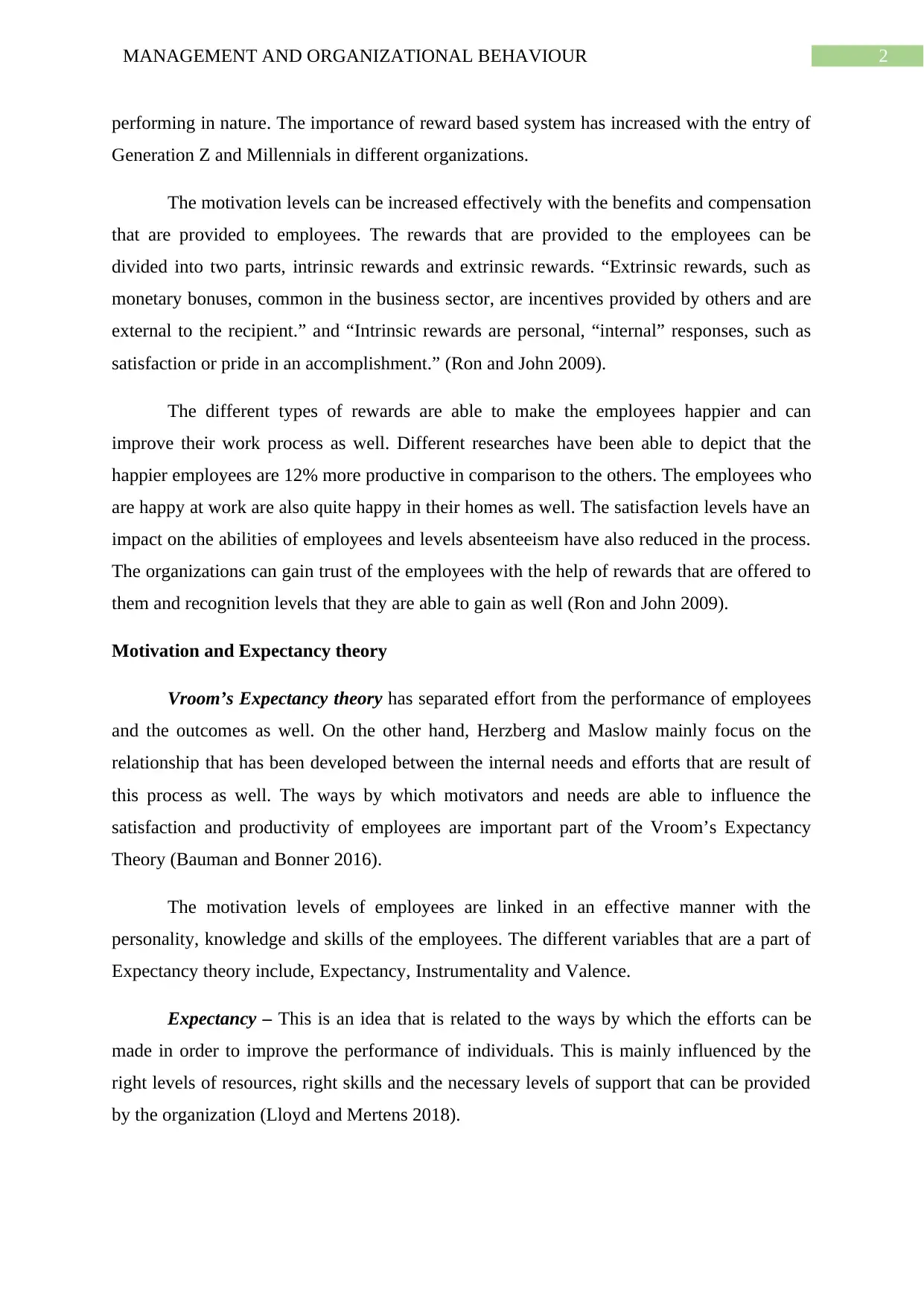
2MANAGEMENT AND ORGANIZATIONAL BEHAVIOUR
performing in nature. The importance of reward based system has increased with the entry of
Generation Z and Millennials in different organizations.
The motivation levels can be increased effectively with the benefits and compensation
that are provided to employees. The rewards that are provided to the employees can be
divided into two parts, intrinsic rewards and extrinsic rewards. “Extrinsic rewards, such as
monetary bonuses, common in the business sector, are incentives provided by others and are
external to the recipient.” and “Intrinsic rewards are personal, “internal” responses, such as
satisfaction or pride in an accomplishment.” (Ron and John 2009).
The different types of rewards are able to make the employees happier and can
improve their work process as well. Different researches have been able to depict that the
happier employees are 12% more productive in comparison to the others. The employees who
are happy at work are also quite happy in their homes as well. The satisfaction levels have an
impact on the abilities of employees and levels absenteeism have also reduced in the process.
The organizations can gain trust of the employees with the help of rewards that are offered to
them and recognition levels that they are able to gain as well (Ron and John 2009).
Motivation and Expectancy theory
Vroom’s Expectancy theory has separated effort from the performance of employees
and the outcomes as well. On the other hand, Herzberg and Maslow mainly focus on the
relationship that has been developed between the internal needs and efforts that are result of
this process as well. The ways by which motivators and needs are able to influence the
satisfaction and productivity of employees are important part of the Vroom’s Expectancy
Theory (Bauman and Bonner 2016).
The motivation levels of employees are linked in an effective manner with the
personality, knowledge and skills of the employees. The different variables that are a part of
Expectancy theory include, Expectancy, Instrumentality and Valence.
Expectancy – This is an idea that is related to the ways by which the efforts can be
made in order to improve the performance of individuals. This is mainly influenced by the
right levels of resources, right skills and the necessary levels of support that can be provided
by the organization (Lloyd and Mertens 2018).
performing in nature. The importance of reward based system has increased with the entry of
Generation Z and Millennials in different organizations.
The motivation levels can be increased effectively with the benefits and compensation
that are provided to employees. The rewards that are provided to the employees can be
divided into two parts, intrinsic rewards and extrinsic rewards. “Extrinsic rewards, such as
monetary bonuses, common in the business sector, are incentives provided by others and are
external to the recipient.” and “Intrinsic rewards are personal, “internal” responses, such as
satisfaction or pride in an accomplishment.” (Ron and John 2009).
The different types of rewards are able to make the employees happier and can
improve their work process as well. Different researches have been able to depict that the
happier employees are 12% more productive in comparison to the others. The employees who
are happy at work are also quite happy in their homes as well. The satisfaction levels have an
impact on the abilities of employees and levels absenteeism have also reduced in the process.
The organizations can gain trust of the employees with the help of rewards that are offered to
them and recognition levels that they are able to gain as well (Ron and John 2009).
Motivation and Expectancy theory
Vroom’s Expectancy theory has separated effort from the performance of employees
and the outcomes as well. On the other hand, Herzberg and Maslow mainly focus on the
relationship that has been developed between the internal needs and efforts that are result of
this process as well. The ways by which motivators and needs are able to influence the
satisfaction and productivity of employees are important part of the Vroom’s Expectancy
Theory (Bauman and Bonner 2016).
The motivation levels of employees are linked in an effective manner with the
personality, knowledge and skills of the employees. The different variables that are a part of
Expectancy theory include, Expectancy, Instrumentality and Valence.
Expectancy – This is an idea that is related to the ways by which the efforts can be
made in order to improve the performance of individuals. This is mainly influenced by the
right levels of resources, right skills and the necessary levels of support that can be provided
by the organization (Lloyd and Mertens 2018).
⊘ This is a preview!⊘
Do you want full access?
Subscribe today to unlock all pages.

Trusted by 1+ million students worldwide
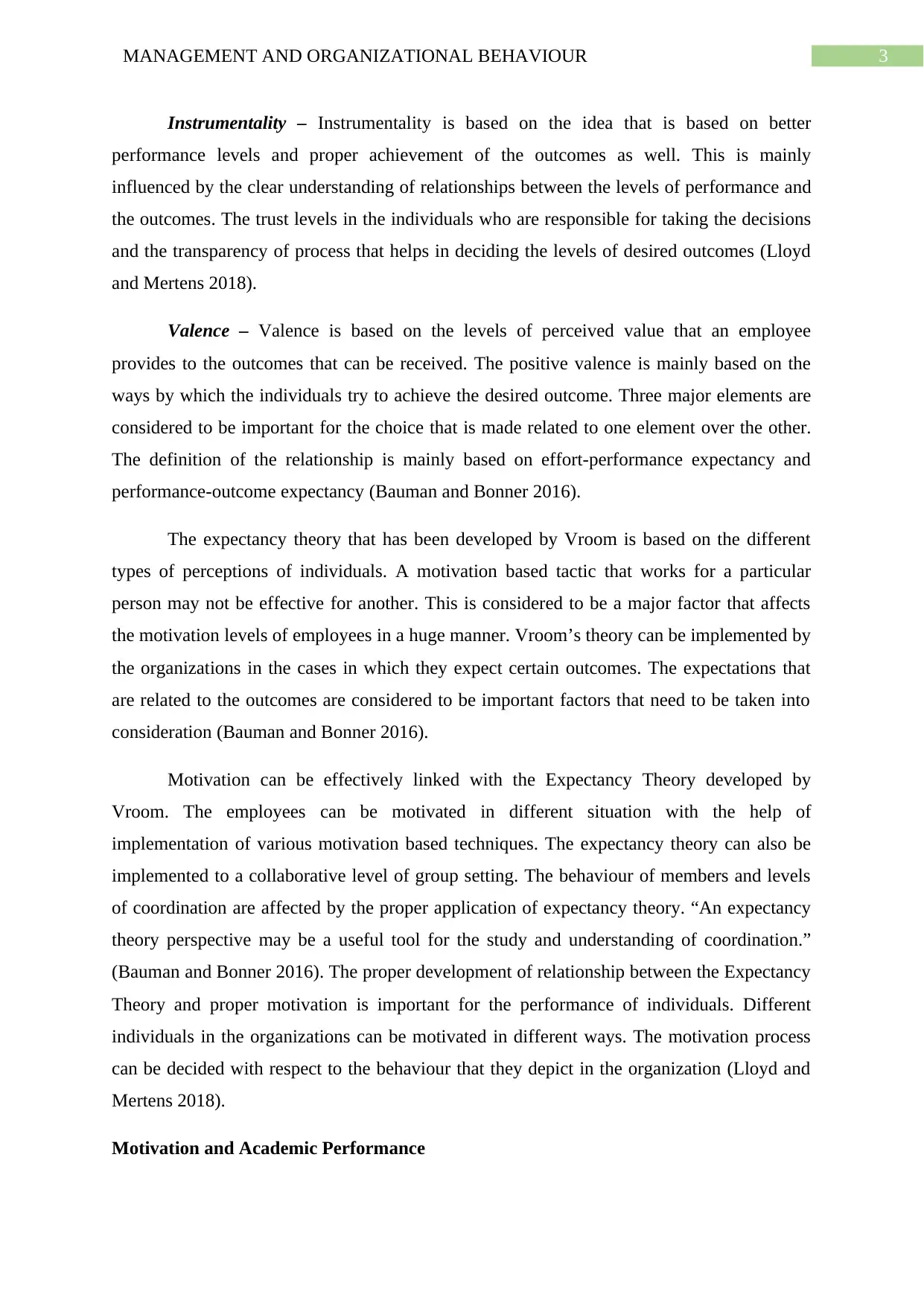
3MANAGEMENT AND ORGANIZATIONAL BEHAVIOUR
Instrumentality – Instrumentality is based on the idea that is based on better
performance levels and proper achievement of the outcomes as well. This is mainly
influenced by the clear understanding of relationships between the levels of performance and
the outcomes. The trust levels in the individuals who are responsible for taking the decisions
and the transparency of process that helps in deciding the levels of desired outcomes (Lloyd
and Mertens 2018).
Valence – Valence is based on the levels of perceived value that an employee
provides to the outcomes that can be received. The positive valence is mainly based on the
ways by which the individuals try to achieve the desired outcome. Three major elements are
considered to be important for the choice that is made related to one element over the other.
The definition of the relationship is mainly based on effort-performance expectancy and
performance-outcome expectancy (Bauman and Bonner 2016).
The expectancy theory that has been developed by Vroom is based on the different
types of perceptions of individuals. A motivation based tactic that works for a particular
person may not be effective for another. This is considered to be a major factor that affects
the motivation levels of employees in a huge manner. Vroom’s theory can be implemented by
the organizations in the cases in which they expect certain outcomes. The expectations that
are related to the outcomes are considered to be important factors that need to be taken into
consideration (Bauman and Bonner 2016).
Motivation can be effectively linked with the Expectancy Theory developed by
Vroom. The employees can be motivated in different situation with the help of
implementation of various motivation based techniques. The expectancy theory can also be
implemented to a collaborative level of group setting. The behaviour of members and levels
of coordination are affected by the proper application of expectancy theory. “An expectancy
theory perspective may be a useful tool for the study and understanding of coordination.”
(Bauman and Bonner 2016). The proper development of relationship between the Expectancy
Theory and proper motivation is important for the performance of individuals. Different
individuals in the organizations can be motivated in different ways. The motivation process
can be decided with respect to the behaviour that they depict in the organization (Lloyd and
Mertens 2018).
Motivation and Academic Performance
Instrumentality – Instrumentality is based on the idea that is based on better
performance levels and proper achievement of the outcomes as well. This is mainly
influenced by the clear understanding of relationships between the levels of performance and
the outcomes. The trust levels in the individuals who are responsible for taking the decisions
and the transparency of process that helps in deciding the levels of desired outcomes (Lloyd
and Mertens 2018).
Valence – Valence is based on the levels of perceived value that an employee
provides to the outcomes that can be received. The positive valence is mainly based on the
ways by which the individuals try to achieve the desired outcome. Three major elements are
considered to be important for the choice that is made related to one element over the other.
The definition of the relationship is mainly based on effort-performance expectancy and
performance-outcome expectancy (Bauman and Bonner 2016).
The expectancy theory that has been developed by Vroom is based on the different
types of perceptions of individuals. A motivation based tactic that works for a particular
person may not be effective for another. This is considered to be a major factor that affects
the motivation levels of employees in a huge manner. Vroom’s theory can be implemented by
the organizations in the cases in which they expect certain outcomes. The expectations that
are related to the outcomes are considered to be important factors that need to be taken into
consideration (Bauman and Bonner 2016).
Motivation can be effectively linked with the Expectancy Theory developed by
Vroom. The employees can be motivated in different situation with the help of
implementation of various motivation based techniques. The expectancy theory can also be
implemented to a collaborative level of group setting. The behaviour of members and levels
of coordination are affected by the proper application of expectancy theory. “An expectancy
theory perspective may be a useful tool for the study and understanding of coordination.”
(Bauman and Bonner 2016). The proper development of relationship between the Expectancy
Theory and proper motivation is important for the performance of individuals. Different
individuals in the organizations can be motivated in different ways. The motivation process
can be decided with respect to the behaviour that they depict in the organization (Lloyd and
Mertens 2018).
Motivation and Academic Performance
Paraphrase This Document
Need a fresh take? Get an instant paraphrase of this document with our AI Paraphraser
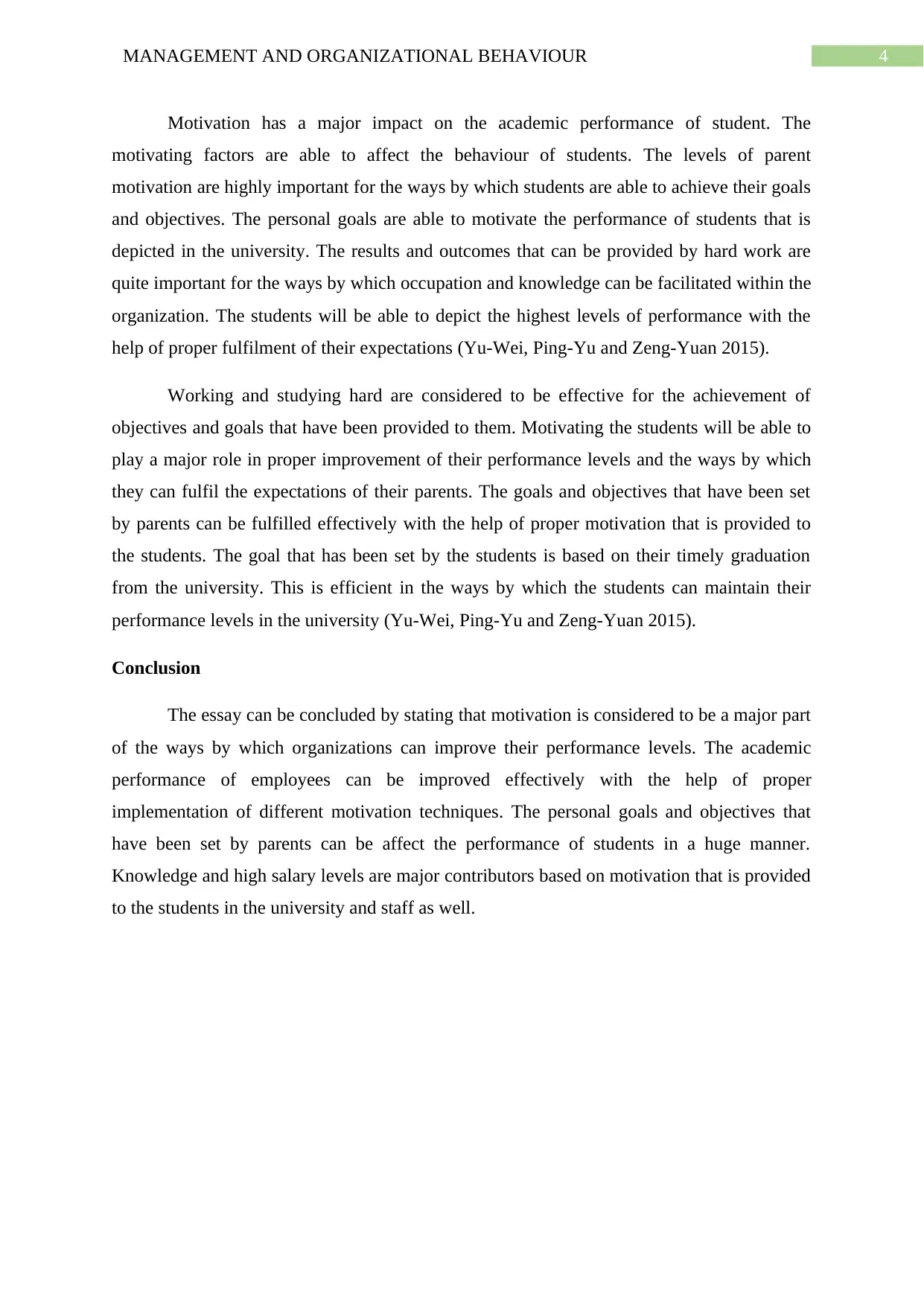
4MANAGEMENT AND ORGANIZATIONAL BEHAVIOUR
Motivation has a major impact on the academic performance of student. The
motivating factors are able to affect the behaviour of students. The levels of parent
motivation are highly important for the ways by which students are able to achieve their goals
and objectives. The personal goals are able to motivate the performance of students that is
depicted in the university. The results and outcomes that can be provided by hard work are
quite important for the ways by which occupation and knowledge can be facilitated within the
organization. The students will be able to depict the highest levels of performance with the
help of proper fulfilment of their expectations (Yu-Wei, Ping-Yu and Zeng-Yuan 2015).
Working and studying hard are considered to be effective for the achievement of
objectives and goals that have been provided to them. Motivating the students will be able to
play a major role in proper improvement of their performance levels and the ways by which
they can fulfil the expectations of their parents. The goals and objectives that have been set
by parents can be fulfilled effectively with the help of proper motivation that is provided to
the students. The goal that has been set by the students is based on their timely graduation
from the university. This is efficient in the ways by which the students can maintain their
performance levels in the university (Yu-Wei, Ping-Yu and Zeng-Yuan 2015).
Conclusion
The essay can be concluded by stating that motivation is considered to be a major part
of the ways by which organizations can improve their performance levels. The academic
performance of employees can be improved effectively with the help of proper
implementation of different motivation techniques. The personal goals and objectives that
have been set by parents can be affect the performance of students in a huge manner.
Knowledge and high salary levels are major contributors based on motivation that is provided
to the students in the university and staff as well.
Motivation has a major impact on the academic performance of student. The
motivating factors are able to affect the behaviour of students. The levels of parent
motivation are highly important for the ways by which students are able to achieve their goals
and objectives. The personal goals are able to motivate the performance of students that is
depicted in the university. The results and outcomes that can be provided by hard work are
quite important for the ways by which occupation and knowledge can be facilitated within the
organization. The students will be able to depict the highest levels of performance with the
help of proper fulfilment of their expectations (Yu-Wei, Ping-Yu and Zeng-Yuan 2015).
Working and studying hard are considered to be effective for the achievement of
objectives and goals that have been provided to them. Motivating the students will be able to
play a major role in proper improvement of their performance levels and the ways by which
they can fulfil the expectations of their parents. The goals and objectives that have been set
by parents can be fulfilled effectively with the help of proper motivation that is provided to
the students. The goal that has been set by the students is based on their timely graduation
from the university. This is efficient in the ways by which the students can maintain their
performance levels in the university (Yu-Wei, Ping-Yu and Zeng-Yuan 2015).
Conclusion
The essay can be concluded by stating that motivation is considered to be a major part
of the ways by which organizations can improve their performance levels. The academic
performance of employees can be improved effectively with the help of proper
implementation of different motivation techniques. The personal goals and objectives that
have been set by parents can be affect the performance of students in a huge manner.
Knowledge and high salary levels are major contributors based on motivation that is provided
to the students in the university and staff as well.
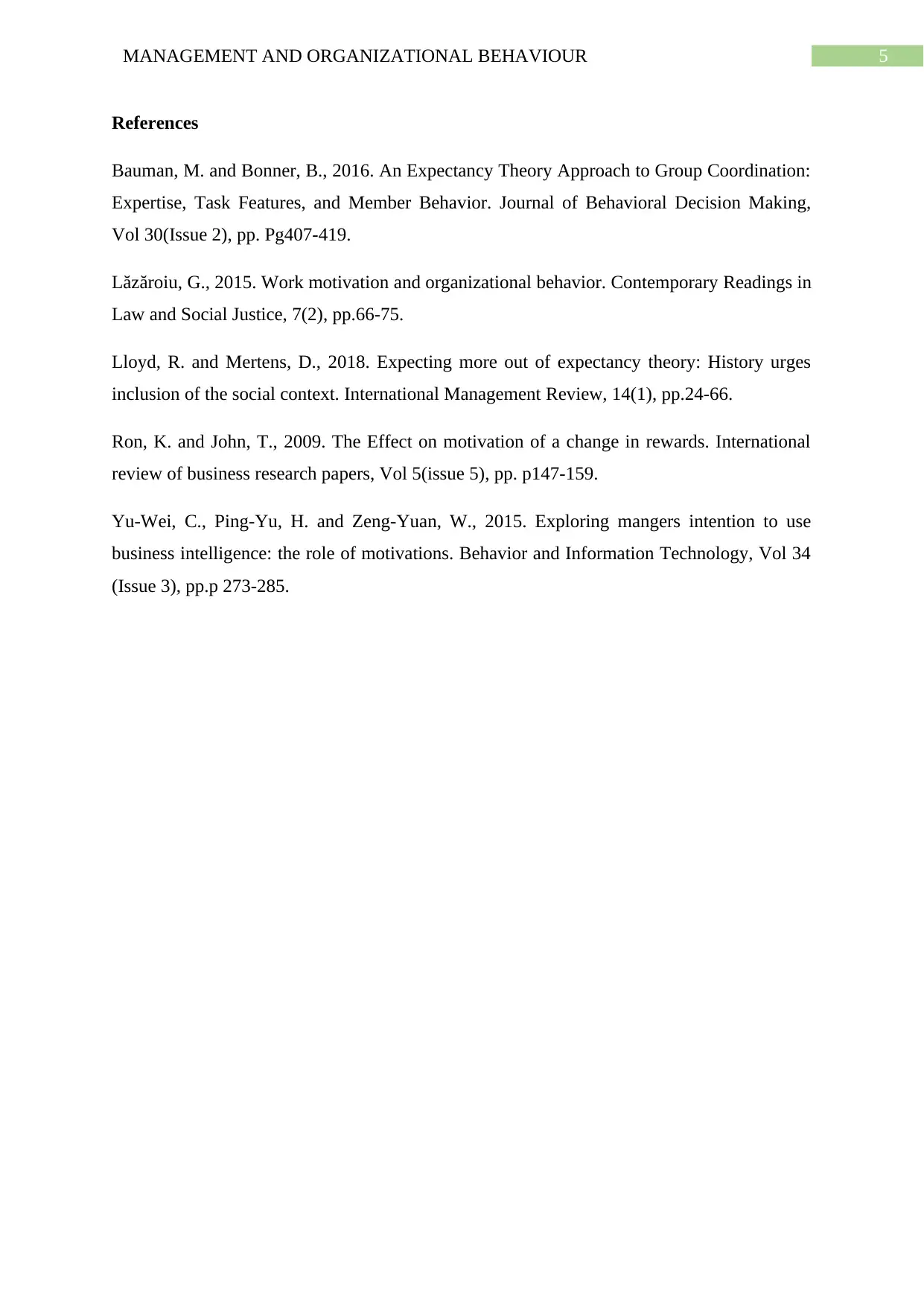
5MANAGEMENT AND ORGANIZATIONAL BEHAVIOUR
References
Bauman, M. and Bonner, B., 2016. An Expectancy Theory Approach to Group Coordination:
Expertise, Task Features, and Member Behavior. Journal of Behavioral Decision Making,
Vol 30(Issue 2), pp. Pg407-419.
Lăzăroiu, G., 2015. Work motivation and organizational behavior. Contemporary Readings in
Law and Social Justice, 7(2), pp.66-75.
Lloyd, R. and Mertens, D., 2018. Expecting more out of expectancy theory: History urges
inclusion of the social context. International Management Review, 14(1), pp.24-66.
Ron, K. and John, T., 2009. The Effect on motivation of a change in rewards. International
review of business research papers, Vol 5(issue 5), pp. p147-159.
Yu-Wei, C., Ping-Yu, H. and Zeng-Yuan, W., 2015. Exploring mangers intention to use
business intelligence: the role of motivations. Behavior and Information Technology, Vol 34
(Issue 3), pp.p 273-285.
References
Bauman, M. and Bonner, B., 2016. An Expectancy Theory Approach to Group Coordination:
Expertise, Task Features, and Member Behavior. Journal of Behavioral Decision Making,
Vol 30(Issue 2), pp. Pg407-419.
Lăzăroiu, G., 2015. Work motivation and organizational behavior. Contemporary Readings in
Law and Social Justice, 7(2), pp.66-75.
Lloyd, R. and Mertens, D., 2018. Expecting more out of expectancy theory: History urges
inclusion of the social context. International Management Review, 14(1), pp.24-66.
Ron, K. and John, T., 2009. The Effect on motivation of a change in rewards. International
review of business research papers, Vol 5(issue 5), pp. p147-159.
Yu-Wei, C., Ping-Yu, H. and Zeng-Yuan, W., 2015. Exploring mangers intention to use
business intelligence: the role of motivations. Behavior and Information Technology, Vol 34
(Issue 3), pp.p 273-285.
⊘ This is a preview!⊘
Do you want full access?
Subscribe today to unlock all pages.

Trusted by 1+ million students worldwide
1 out of 6
Related Documents
Your All-in-One AI-Powered Toolkit for Academic Success.
+13062052269
info@desklib.com
Available 24*7 on WhatsApp / Email
![[object Object]](/_next/static/media/star-bottom.7253800d.svg)
Unlock your academic potential
Copyright © 2020–2026 A2Z Services. All Rights Reserved. Developed and managed by ZUCOL.





